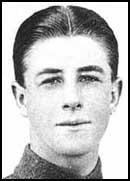James McCudden

James McCudden, the son of a soldier, was born in Gillingham, Kent on 28th March, 1895. In 1910 McCudden joined his father in the Royal Engineers as a bugler. When war was declared in 1914, McCudden was an aircraft mechanic in the Royal Flying Corps. He served in France as an observer and gunner before returning to England to train as a pilot.
McCudden was an exceptional pilot and on 2nd April was awarded the Victoria Cross for "accounting for 54 enemy aeroplanes".
James McCudden was killed on 9th July, 1918, at Auxi le Chateau when his aircraft stalled soon after take off.
Primary Sources
(1) James McCudden, comments appeared in the book Australian Flying Corps published in 1923.
At the time I went to France to fly a fighter-aeroplane I had not even flown the type which I was to fly over the lines next morning, let alone not having received any fighting instruction. I must admit that even after I had flown for five weeks over the lines as a pilot, when I went on to De Havilland scouts I did not even appreciate the necessity of turning at once when an opponent got behind me, and I only just realised that to get directly behind him to get a shot at him.
(2) James McCudden, interview (1918)
I consider it a patrol leader's work to pay more attention to the main points of the fight than to do all the fighting himself. The main points are: (1) arrival of more EA who have tactical advantage, i.e. height; (2) patrol drifting too far east; (3) patrol getting below bulk of enemy formation. As soon as any of these circumstances occur, it is time to take advantage of the SE's superior speed over EA scouts and break off the fight, rally behind leader and climb west of EA until you are above them before attacking them again
(3) London Gazette (2nd April, 1918)
For most conspicuous bravery, exceptional perseverance, and a very high devotion to duty. Captain McCudden has at the present time accounted for 54 enemy aeroplanes. Of these, 42 have been destroyed, 19 of them on our side of the lines. Only 12 out of the 54 have been driven down out of control. On two occasions, he had totally destroyed 4 two-seater enemy aeroplanes on the same day, and on the last occasion all 4 machines were destroyed in the space of one hour and thirty minutes. While in his present squadron, he has participated in 78 offensive patrols, and in nearly every case has been the leader. On at least 30 occasions, whilst with the same squadron, he has crossed the lines alone, either in pursuit or in quest of enemy aeroplanes. The following incidents are examples of the work he has done recently: on 23 December 1917, when leading his patrol, 8 enemy aeroplanes were attacked between 1430/1550 and of these 2 were shot down by Captain McCudden in our lines; on the morning of the same day, he left the ground at 1050 and encountered 4 enemy aeroplanes and of these he shot 2 down; on 30 January 1918, he, single-handed, attacked 5 enemy scouts, as a result of which 2 were destroyed. On this occasion, he only returned home when the enemy scouts had been driven far east; his Lewis gun ammunition was all finished and the belt of his Vickers gun had broken. As a patrol leader he has at all times shown the utmost gallantry and skill, not only in the manner in which he has attacked and destroyed the enemy, but in the way he has, during several aerial fights, protected the newer members of his flight, thus keeping down their casualties to a minimum. This officer is considered, by the record he has made, by his fearlessness, and by the great service which he has rendered to his country, deserving of the very highest honour.
